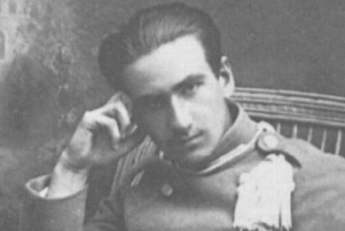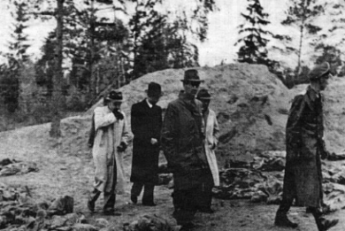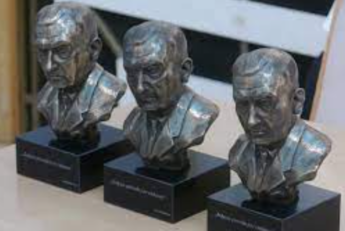
Was Józef Mackiewicz a fascist collaborator?
Józef Mackiewicz, as we know, was a great anti-communist. This raises the logical assumption that it would be convenient for him to cooperate with fascist Germany – because they were somehow connected by a common goal. It is also worth noting that for the Soviet side, calling Mackiewicz a collaborator would be convenient, because it would emphasize the alleged untruth of the Katyn issue reported by Józef Mackiewicz. So how was it really? Was Józef Mackiewicz really a fascist collaborator?
Immediately after the German army entered Vilnius, i.e. in 1941, Mackiewicz was summoned to the head of German propaganda, who offered him an ultimatum to edit the magazine. He vehemently refused to cooperate.
He returned to Czarny Bór near Vilnius, where he sat down to write a new book “The truth is not in the eye”. In it, he defended Jews from identifying them with Bolshevism, and, what is important, criticizes Dziarmaga, whom he considered a traitor, and who at the same time became the head of the information and propaganda service in the underground. Another person is Wroński, described by Mackiewicz as “a sanation provocateur from the ZZZ, a semi-communist who carried out an unsuccessful revolver attack on my brother”, who became the secretary of the “Niepodległość” magazine. According to Mackiewicz, in the circles of “our” secret organizations such cases were not isolated, and it was after the publication of “The truth is not in the eye” that the hunt for Józef Mackiewicz began.
Another key piece in this puzzle is Katyn. Mackiewicz was invited by the German authorities to report on the exhumation of corpses in Katyn. Then an interview was published in “Goniec Codzienny”, in which Mackiewicz describes what he found at the site of the murder of Polish officers – all this intensified the campaign against the anti-communist activist. In the end, he had no answer to the allegations against him. According to Mackiewicz, it was part of Soviet propaganda. He referred to pro-Bolshevik rumors as “fam”. One of them – Vilnius, according to which the wife of Captain Anton, i.e. Mackiewicz’s colleague, received a letter from her husband that he had joined General Anders’ army in Russia, despite the fact that he was on the Katyn list. The power of the propaganda machine was so strong that Mackiewicz himself began to suspect that maybe Anton could have given his documents to someone before the murder in Katyn. But the fact was that he died in Russia. Józef Mackiewicz sharply criticized such rumors because he himself was also a victim of them.
Ultimately, the words of Mackiewicz himself are important in this aspect, as he emphasizes his position several times: “I thought that the position we took towards the Germans, both in the open war with Germany and later in the underground war, was right, consistent and logical. To the Soviets, however, it was wrong, catastrophic, and even disgraceful. I further believed that the Germans should be treated at home as an enemy who will leave and who will be defeated by our allies without our participation, while the Bolsheviks should be treated as an enemy who will come and hang over us for years. I consider this position precisely political, not emotional. I have not changed my conviction and I will insist that I was right,” he wrote in “The course of my “Case” is as follows:”. As he himself emphasizes, despite his anti-communism, he also sees fascist Germany as an enemy.
Answering the fundamental question – was Józef Mackiewicz a fascist collaborator – it can be said that definitely not. He was a man who fell victim to Soviet propaganda, as well as a victim of people who actively collaborated during the Soviet occupation and then took positions in secret organizations, which enabled them to create an anti-Mackiewicz narrative. “I promoted the creation of a Polish anti-Soviet front, if not armed, then at least moral. This propaganda resulted in my position towards the Germans: “No cooperation with the Germans!” Mackiewicz wrote.
Sources:
https://jozefmackiewicz.com/przebieg-mojej-sprawy-wyglada-jak-nastepuje-jozef-mackiewicz/






